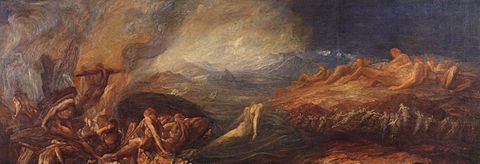|
|
| |
|
|
| |
|
|
|
|
| |
 |
| Chaos refers to the
void state preceding the creation of the
universe or cosmos in the Greek creation myths,
or to the initial "gap" created by the original
separation of heaven and earth. |
Deities
In Greek mythology the primordial deities are the first
entities or beings that came into existence. These
deities are a group of gods from which all others
descend. They most notably include Uranus (Father Sky)
and Gaia (Mother Earth), who preceded the Titans, who
themselves preceded the Olympians.
Genealogy and nature
Although generally believed to be the first gods
produced from Chaos, some sources mention a pair of
deities who were the parents of the group. These deities
represent various elements of nature. Chaos has at times
been considered, in place of Ananke, the female consort
of Chronos.
The primordial gods are depicted as places or realms. A
common example is Tartarus, who is depicted as the
Underworld, Hell, and a bottomless abyss. His sibling,
Erebus, is also depicted as a place of pitch-black
darkness or a vast emptiness of space.
Their mother, Chaos, is depicted as an empty void. Other
siblings that include Gaia are depicted as Mother Nature
or the Earth. Pontus or Hydros are depicted as the
oceans, lakes, and rivers. Chronos is depicted as time
and of eternity. |
|
Hesiod
According to Hesiod's Theogony (c. 700 BC): |
- Chaos (Void)
- Erebus (Darkness) (male) and Nyx
(Night) (female)
- Aether (Light) (male) and Hemera
(Day) (female)
- Uranus (Heaven) (male) and Gaia
(Earth) (female)
- Ourea (Mountains) (male)
- Pontus (Sea) (male)
- Tartarus (Underworld) (male)
|
|
|
Other sources |
- Physis (Genesi) (female)
- Ananke (Compulsion) (female)
- Chronos (Time) (male)
- Hydros (Primordial Waters) (male)
- Himeros (Tension) (male)
- Thesis (Creation) (female)
- Moirai (Revelation) (female)
- Phanes (Appearance) (male)
- Nesoi (Island) (female)
- Thalassa (Sea) (female)
- Ophion (Life) (male)
- Oceanus (Ocean) (male)
- Eros (Procreation) (male)
- Protogeneia (First Born) (female)
- Phusis (Nature) (female)
|
|
Other genealogy structures
The ancient Greeks proposed many different ideas about
primordial deities in their mythology, which was largely
adapted by the Romans. The many religious cosmologies
constructed by Greek poets each give a different account
of which deities came first. |
- The Iliad, an epic poem
attributed to Homer about the Trojan War (an oral
tradition of 700 or 600 BC), states that Oceanus
(and possibly Tethys, too) is the parent of all the
/deities.
- Alcman (fl. 7th century BC) made
the water-nymph Thetis the first goddess, producing
poros (path), tekmor (marker) and skotos (darkness)
on the pathless, featureless void.
- Orphic poetry (c. 530 BC) made
Nyx the first principle, Night, and her offspring
were many. Also, in the Orphic tradition, Phanes (a
mystic Orphic deity of light and procreation,
sometimes identified with the Elder Eros) is the
original ruler of the universe, who hatched from the
cosmic egg.
- Aristophanes (c. 446 BC – c. 386
BC) wrote in his Birds, that Nyx is the first deity
also, and that she produced Eros from an egg.
|
|
Philosophers of Classical Greece also constructed their own
metaphysical cosmogonies, with their own primordial deities: |
- Pherecydes of Syros (c. 600 – c. 550
BC) made Chronos (time) the first deity in his
Heptamychia.
- Empedocles (c. 490 – 430 BC) wrote
that Philotes ("Love") and Neikos ("Hate") were the
first principles, who wove the universe out of the four
elements with their powers of love and strife.
- Plato (c. 428/427 – 348/347 BC)
introduced the concept in Timaeus, of the demiurge, who
modeled the universe on the Ideas.
|
|
|
|
|
|
|
|
|
|
|
|
|
|
|
|
|
|
|
Search Fun Easy English |
|
|
|
|
|
|
|
|
|
|
|
|
|
|
|
About
Contact
Copyright
Resources
Site Map |